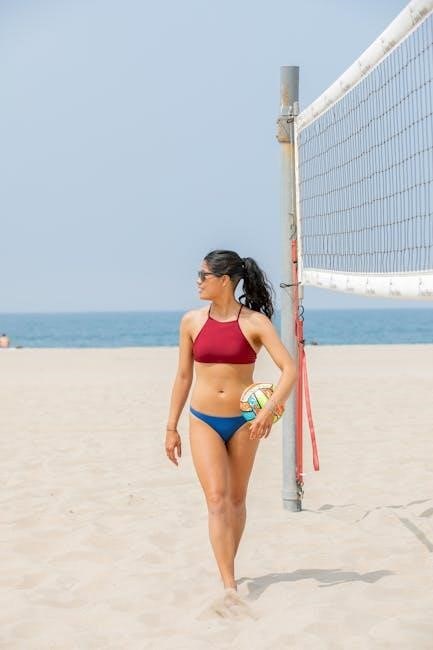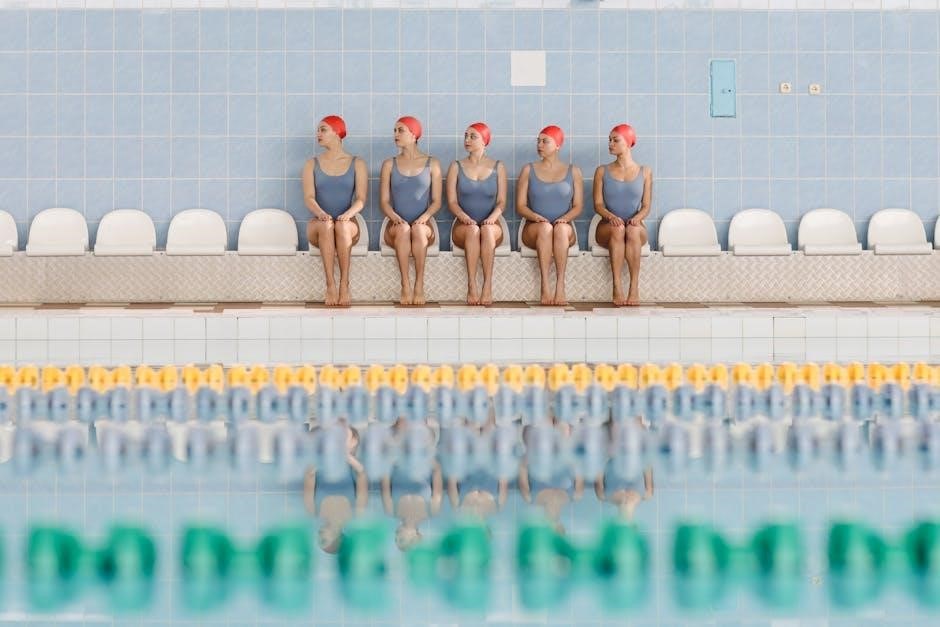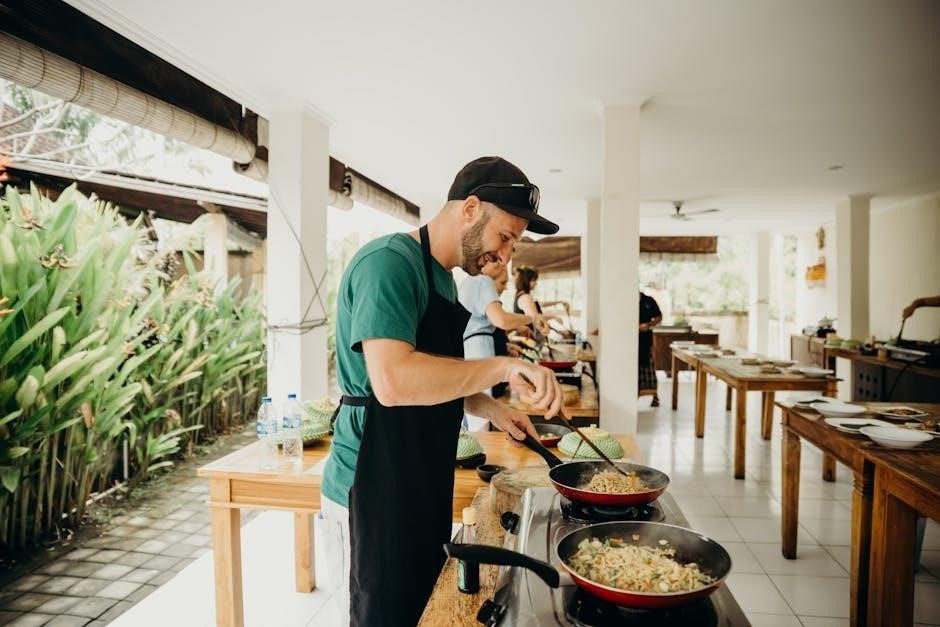A structured bikini competition meal plan is essential for achieving a lean, toned physique. It focuses on balanced macronutrients, hydration, and portion control to optimize fat loss while preserving muscle. A well-designed plan ensures sustainability and peak performance, guiding competitors through off-season, prep, and peak week phases. Personalization is key to success.

Overview of Bikini Competitions
Bikini competitions are a popular category in fitness events, emphasizing a balanced, athletic physique with a focus on lean muscle tone and overall aesthetics. Competitors are judged on stage presence, confidence, and physical conditioning, aiming for a healthy, fit appearance rather than extreme muscularity. The bikini category differs from figure or physique competitions, as it prioritizes a softer, more feminine look. Competitors typically follow a structured meal plan and training regimen to achieve the desired body composition. The competitions are divided into categories based on height or experience level, ensuring fair judging. Success in bikini competitions requires dedication, discipline, and a well-rounded approach to fitness and nutrition.
Importance of a Structured Meal Plan
A structured meal plan is crucial for bikini competition prep, ensuring fat loss while preserving muscle mass. It provides clarity and consistency, preventing setbacks and maintaining focus. A well-designed plan tailors macronutrient intake to individual goals, optimizing energy levels and recovery. Without structure, competitors risk over- or under-eating, leading to poor performance or unwanted fat retention. A structured plan also helps manage cravings and portion control, essential for achieving a lean physique. Additionally, it ensures nutrient balance, supporting overall health and aesthetics. Customization is key, as generic plans may not meet specific needs. Professional guidance further enhances effectiveness, making a structured meal plan indispensable for success in bikini competitions.
Key Components of a Bikini Competition Diet
A bikini competition diet focuses on three main macronutrients: protein, carbohydrates, and fats. Protein is essential for muscle preservation and recovery, while carbohydrates provide energy for workouts. Healthy fats support hormone function. The diet also emphasizes hydration, with at least one gallon of water daily. Sodium intake is controlled to minimize water retention. Meal frequency varies, typically involving 5-6 small meals to maintain metabolism. Supplements like whey protein and BCAAs are often included. A structured plan avoids processed foods, focusing on whole, nutrient-dense options. Caloric intake is adjusted based on goals, with a deficit for fat loss. A well-balanced approach ensures athletes maintain peak performance while achieving a lean, stage-ready physique.

Understanding the Importance of Nutrition
Nutrition is crucial for fat loss, muscle preservation, and energy during bikini competition prep. A structured meal plan ensures optimal macronutrient balance, hydration, and electrolyte management for peak performance.
Role of Macronutrients in Fat Loss and Muscle Preservation
Macronutrients play a vital role in bikini competition prep by balancing fat loss and muscle retention. Protein is essential for muscle repair and growth, while carbohydrates provide energy for workouts. Healthy fats support hormone production and overall health. A structured meal plan ensures adequate intake of each macronutrient, optimizing metabolism and physical performance. Proper ratios of protein, carbs, and fats help maintain muscle mass during caloric deficits, promoting a lean, toned physique. This balance is critical for achieving competition-ready results without compromising muscle integrity or energy levels.
Caloric Intake and Deficit for Competition Prep
Caloric intake and deficit are cornerstone strategies in bikini competition prep, ensuring fat loss while maintaining muscle. A structured deficit creates a metabolic environment where the body burns stored fat for energy. Competitors typically consume fewer calories than they burn, with adjustments made based on progress. The deficit is carefully managed to avoid muscle loss, with macronutrient ratios optimized for preservation. During prep phases, caloric intake may decrease gradually, while off-season periods allow for higher calories to build muscle. Personalized plans consider factors like metabolism, activity level, and goals. A well-executed caloric deficit ensures a lean, defined physique, essential for success on stage.
Hydration and Its Impact on Physique
Hydration plays a vital role in achieving a competition-ready physique. Proper water intake supports fat loss, muscle recovery, and overall performance. Even mild dehydration can impair metabolism, reduce energy levels, and negatively impact appearance by causing water retention and dull skin. Competitors are often advised to consume at least one gallon of water daily, adjusting for activity levels and sweat loss. Additionally, managing electrolyte balance, particularly sodium and potassium, is crucial to maintain fluid balance and muscle function. Staying hydrated ensures optimal digestion, nutrient absorption, and a lean, defined look on stage. Monitoring hydration levels and adjusting intake as needed is essential for peak competition prep success.

Creating a Personalized Meal Plan
A personalized meal plan tailors calories, protein, carbs, and fats to individual needs, ensuring sustainable fat loss and muscle preservation. Adjustments are made based on progress and goals for competition prep.
Calculating Macronutrient Needs
Calculating macronutrient needs is crucial for a bikini competition meal plan. Protein intake is typically set at 1.2-2.2g per kg of body weight to preserve muscle mass. Carbohydrates are adjusted based on activity levels and fat loss goals, while fats are kept moderate to support hormone function. A caloric deficit is necessary for fat loss, but it must be balanced to avoid muscle loss. Macronutrient ratios are tailored to individual goals, with adjustments made as progress is monitored. This ensures the plan remains effective and sustainable throughout the competition prep phase. Working with a coach or nutritionist can help refine these calculations for optimal results.
Meal Frequency and Timing Strategies
Meal frequency and timing play a significant role in bikini competition prep. Competitors often opt for 5-6 smaller meals daily to maintain metabolism and prevent excessive hunger. Pre- and post-workout nutrition is critical, with meals typically consumed 1-2 hours before training and within 30-60 minutes after. This strategy supports muscle recovery and growth. Hydration is emphasized, with water intake spread evenly throughout the day. Some plans include a protein shake before bed to aid overnight recovery. Timing meals strategically helps regulate energy levels, supports fat loss, and ensures optimal nutrient absorption. Consistency in meal timing is key to achieving physique goals and maintaining overall health during prep.
Balancing Protein, Carbs, and Fats
Balancing protein, carbs, and fats is crucial for a bikini competition meal plan. Protein is essential for muscle preservation and recovery, typically accounting for 1.2-2.2 grams per kilogram of body weight. Carbohydrates fuel workouts and support fat loss, with low-glycemic sources like oats and sweet potatoes being ideal. Fats, though consumed in moderation, are vital for hormone health and satiety. A common ratio is 40% protein, 40% carbs, and 20% fats, but this varies based on individual needs and goals. Adjustments are made during different phases, such as increasing carbs for energy during peak week. A well-balanced diet ensures sustained energy, muscle retention, and fat loss, helping competitors achieve a lean, stage-ready physique.
Integrating Supplements for Optimal Results
Supplements play a strategic role in enhancing bikini competition prep by addressing nutritional gaps and optimizing performance. Protein powder, such as whey or plant-based options, supports muscle recovery and growth, especially when whole food intake is restricted. Branched-Chain Amino Acids (BCAAs) help reduce muscle soreness and maintain mass during intense training. Fat burners, including caffeine and green tea extract, can aid in fat loss, though caution is advised to avoid overstimulation. Electrolytes and hydration supplements are critical during peak week to maintain water balance and physique clarity. Additionally, omega-3 fatty acids support overall health and reduce inflammation. Supplements should complement, not replace, a balanced diet, and their use must be tailored to individual needs and competition goals for maximum effectiveness.

Phases of a Bikini Competition Meal Plan
A bikini competition meal plan is divided into three phases: off-season, preparation, and peak week. Each phase focuses on building muscle, cutting fat, and refining physique for stage-ready results.
Off-Season Nutrition Plan
The off-season nutrition plan is designed to build muscle and improve overall body composition. It focuses on a calorie-surplus diet with balanced macronutrients, typically higher in carbohydrates and proteins, while maintaining healthy fats. This phase emphasizes progressive overload in training and recovery, allowing competitors to develop muscle mass without excessive fat gain. Meals are often less restrictive, promoting flexibility and sustainability. A well-structured off-season plan sets the foundation for a successful competition prep phase, ensuring athletes have the muscle mass and strength needed to achieve their goals during the cutting phase.
Preparation Phase Diet Adjustments
During the preparation phase, the diet shifts to a calorie deficit to promote fat loss while maintaining muscle mass. Macronutrient ratios are adjusted, with increased protein intake to preserve lean tissue and controlled carbohydrates to support energy needs. Healthy fats are minimized but still included for hormonal balance. Meal frequency is optimized, often involving 5-6 smaller meals to maintain metabolism and satiety. Hydration becomes critical, with a focus on reducing sodium intake to enhance physique visibility. Adjustments are tailored to individual progress, ensuring the body adapts without excessive stress. This phase requires strict adherence to the meal plan to achieve the desired lean and toned appearance for competition day.
Peak Week Nutrition Strategy
Peak week nutrition is finely tuned to enhance physique visibility. Carbohydrate intake is strategically manipulated to maximize vascularity and muscle definition while minimizing water retention. Water intake is carefully controlled, with a gradual reduction to highlight muscle separation. Electrolytes like sodium and potassium are closely monitored to prevent bloating. Protein remains high to maintain muscle integrity, while fats are kept minimal. The focus is on clean, easily digestible foods to avoid stomach discomfort. Meal timing is precise, with the final meal optimized for stage presence. This phase requires meticulous planning to ensure the competitor looks their best while maintaining energy and confidence. Every adjustment is tailored to achieve the ultimate competition-ready physique.

Sample Meal Plan Ideas
Breakfast: Egg whites with spinach and whole-grain toast. Lunch: Grilled chicken salad with quinoa. Dinner: Baked salmon with steamed vegetables. Snacks: Greek yogurt or protein shakes. Customize based on macronutrient needs for optimal results.
Breakfast Options for Competition Prep
Breakfast is crucial for kickstarting metabolism and fueling workouts. Popular options include egg whites with spinach and whole-grain toast, or protein pancakes made with oats and protein powder. Greek yogurt with berries, nuts, and chia seeds provides a balanced mix of protein and healthy fats. For a carb-focused meal, oatmeal with almond butter and a scoop of protein powder is ideal. These meals are high in protein, low in sugar, and designed to support fat loss while maintaining muscle. Portion control and macronutrient balance are key to ensuring these breakfasts align with competition goals. They help competitors stay full, energized, and on track for their physique objectives.
Lunch Ideas to Maintain Muscle Mass
Lunch plays a vital role in sustaining energy and muscle mass during competition prep. High-protein options like grilled chicken breast with quinoa and steamed vegetables are ideal. Salmon with sweet potatoes and asparagus provides essential omega-3 fatty acids and complex carbs. For plant-based choices, tofu stir-fries with brown rice and mixed greens are excellent. Turkey lettuce wraps with avocado and tomatoes offer lean protein and healthy fats. These meals are designed to maintain muscle tissue while promoting fat loss. Portion control and balanced macronutrients ensure competitors stay on track without compromising their physique goals. Consistency in meal prep helps maintain progress and overall performance.
Dinner Recipes for Fat Loss
Dinner is a critical meal for fat loss and recovery. Focus on lean proteins like baked chicken breast, cod, or turkey meatballs, paired with low-carb vegetables such as broccoli, cauliflower, or spinach. Sweet potatoes or quinoa can be included for complex carbs. Healthy fats like avocado or olive oil add flavor and support hormone balance. Grilled shrimp with zucchini noodles and cherry tomatoes is another flavorful option. For vegans, lentil stir-fries with mixed greens and a light vinaigrette are nutrient-dense. Hydration is key, so include water-rich foods like cucumbers or celery. Portion control and macronutrient balance ensure fat loss while maintaining muscle. Meal prep ensures consistency and adherence to competition goals.
Healthy Snack Choices
Healthy snacks are essential for maintaining energy and curbing cravings during bikini competition prep. Opt for nutrient-dense options like hard-boiled eggs, Greek yogurt with berries, or a handful of raw almonds. Protein shakes with almond milk and a scoop of lean protein powder are convenient and macro-friendly. Veggies like cucumbers, bell peppers, or celery paired with hummus make for a satisfying crunch. Air-popped popcorn or rice cakes with a drizzle of almond butter are low-calorie, filling choices. Avoid sugary or salty snacks that hinder progress. Stay hydrated with water-rich snacks like watermelon or citrus fruits. These snacks support fat loss while keeping you fueled and focused throughout the day.

Nutrient Timing and Meal Frequency
Strategic meal timing enhances metabolic efficiency and muscle recovery. Aim for 5-6 balanced meals daily, with pre- and post-workout nutrition prioritized for optimal results and muscle preservation.
Pre- and Post-Workout Nutrition
Optimizing pre- and post-workout nutrition is crucial for performance and recovery. Before training, consume a balanced meal or shake with protein, complex carbs, and healthy fats 1-2 hours prior. A protein shake with BCAAs or a meal like oatmeal with berries and almond butter is ideal. Post-workout, prioritize a protein-rich shake within 30 minutes to aid muscle repair, followed by a balanced meal with lean protein and carbs within 1-2 hours. Stay hydrated with water or electrolyte drinks to maintain performance and recovery. Avoid sugary or high-sodium options and limit alcohol to support fat loss and muscle preservation. Customize based on dietary preferences and goals for optimal results.
Spacing Meals for Metabolic Efficiency
Spacing meals evenly throughout the day enhances metabolic efficiency, supporting fat loss and muscle preservation. Consuming 5-6 smaller meals maintains a stable metabolic rate and prevents excessive hunger. This approach ensures consistent energy levels and avoids metabolic slowdowns. Balanced meals with protein, carbs, and fats keep nutrient levels steady, promoting optimal bodily functions. Timing meals around workouts and rest periods maximizes nutrient utilization. Avoiding long fasting periods maintains fat-burning efficiency and supports overall health. A structured eating schedule aligns with competition goals, ensuring the body remains fueled for performance and recovery. Customizing meal frequency based on individual needs and activity levels is key for sustained success.
Nighttime Eating for Recovery
Nighttime eating plays a crucial role in recovery by replenishing nutrients and supporting muscle repair. A balanced dinner with lean protein, complex carbs, and healthy fats aids in overnight recovery. Avoid high-sugar and high-sodium foods to prevent water retention. Incorporating a protein shake or casein-rich snack before bed promotes muscle synthesis during sleep. Staying hydrated is essential, but excessive water intake should be avoided to prevent bloating. Electrolyte balance can be maintained with small portions of potassium-rich foods. A structured nighttime meal plan ensures the body is fueled for recovery while maintaining fat-loss goals. Consistency in evening nutrition supports overall competition prep success and physical recovery.

Hydration and Electrolyte Management
Proper hydration is vital for physique maintenance and performance. Aim for at least one gallon of water daily, balancing sodium and potassium to regulate body fluids and support recovery.
Water Intake Recommendations
Proper hydration is crucial for bikini competitors, with recommendations to consume at least one gallon of water daily. Staying hydrated supports skin health, digestion, and physical performance. Electrolytes like sodium and potassium must be balanced to prevent dehydration and muscle cramps. Competitors should adjust water intake based on activity levels and sweat loss. Monitoring urine color is a practical guide—pale yellow indicates optimal hydration. Overhydration should be avoided to prevent water retention. During peak week, water intake may be strategically adjusted to enhance stage presence. Consistent hydration habits help maintain a lean, defined physique and support overall health throughout the competition preparation journey.
Managing Sodium and Potassium Levels
Monitoring sodium and potassium intake is vital for bikini competitors to maintain fluid balance and muscle function. Excessive sodium can lead to water retention, while insufficient levels may cause dehydration and fatigue. Potassium helps regulate sodium levels and supports muscle recovery. Competitors are advised to limit processed foods high in sodium and incorporate potassium-rich foods like bananas, sweet potatoes, and spinach. During peak week, sodium intake may be adjusted to minimize water retention, while potassium-rich foods are encouraged to maintain electrolyte balance. Striking the right balance ensures optimal physique presentation and prevents performance-related issues, supporting overall competition readiness and health.
Importance of Electrolyte Balance
Electrolyte balance is crucial for bikini competitors to maintain proper bodily functions, hydration, and muscle contractions. Sodium, potassium, and magnesium are key electrolytes that regulate fluid balance and nerve function. Imbalances can lead to dehydration, muscle cramps, and fatigue, which hinder performance and recovery. Competitors should consume electrolyte-rich foods like bananas, avocados, and nuts, while monitoring sodium intake to avoid water retention. Staying hydrated with water and electrolyte beverages helps maintain equilibrium. Proper electrolyte management ensures optimal physical performance, supports muscle recovery, and enhances overall competition readiness. Balancing these minerals is essential for achieving a lean, healthy physique on stage.

Common Mistakes to Avoid
Common mistakes include over-restricting calories, ignoring meal prep, not adjusting macronutrients, and being impatient. These errors can hinder progress and lead to an unhealthy relationship with food.
Over-restricting Calories
Over-restricting calories is a common mistake that can hinder progress in bikini competition prep. Severely limiting caloric intake may lead to muscle loss, metabolic slowdown, and fatigue. Competitors often believe that extreme calorie deficits accelerate fat loss, but this can backfire, causing the body to hold onto fat and lose lean muscle mass. Additionally, drastic calorie cuts can disrupt hormones and energy levels, making it difficult to maintain consistency in training and daily life. It’s crucial to maintain a balanced intake of protein, carbs, and fats to support muscle preservation and overall health. Consulting a professional ensures a sustainable and realistic caloric intake tailored to individual needs, avoiding the pitfalls of over-restriction.
Ignoring Meal Prep and Planning
Ignoring meal prep and planning is a critical error in bikini competition preparation. Without a structured plan, competitors often struggle with consistency, portion control, and macronutrient balance. Impromptu meals can lead to poor food choices, hindering fat loss and muscle preservation. A lack of organization can result in skipped meals or overeating, derailing progress. Additionally, failing to plan meals can lead to nutrient deficiencies, fatigue, and decreased performance in workouts. A well-prepared meal plan ensures accountability, sustainability, and adherence to dietary goals. It also saves time and reduces stress, allowing competitors to focus on training and recovery. Proper planning is essential for achieving the desired physique and peak conditioning on stage.
Not Adjusting Macronutrients
Not adjusting macronutrients is a common mistake in bikini competition prep. Competitors often stick to a fixed ratio of protein, carbs, and fats without considering their changing needs. As the body adapts, macronutrient requirements may shift to optimize fat loss and muscle preservation. Failing to adjust can lead to stalled progress, muscle loss, or unexpected fat retention. Individual factors like metabolism, activity level, and phase of prep influence macronutrient needs. A one-size-fits-all approach rarely works, and neglecting adjustments can hinder results. Regularly reassessing and tweaking macronutrient ratios ensures the body remains responsive to the diet. This personalized approach is crucial for achieving the desired lean, stage-ready physique. A coach or nutritionist can help tailor these adjustments for optimal success.

Role of a Coach or Nutritionist
A coach or nutritionist provides personalized guidance, creating tailored meal plans and adjusting macronutrients for optimal results. Their expertise ensures a strategic approach to competition prep, offering ongoing support and adjustments to achieve success.
Benefits of Professional Guidance
Working with a coach or nutritionist offers customized strategies tailored to your goals, ensuring a structured approach to competition prep. Their expertise provides a clear roadmap, optimizing macronutrient ratios and meal timing for maximal fat loss and muscle retention. Professional guidance also offers accountability, helping competitors stay disciplined and motivated throughout their journey. A well-designed plan addresses individual needs, such as metabolic variations or dietary preferences, ensuring sustainability and progress. Coaches also provide valuable insights into hydration, electrolyte balance, and recovery, enhancing overall physique presentation. Their support minimizes setbacks, offering adjustments as needed to maintain momentum and achieve peak condition for the stage.
Customizing Your Meal Plan
A personalized bikini competition meal plan ensures your diet aligns with your unique needs, preferences, and goals. This tailored approach considers your metabolic rate, activity level, and body composition to create a sustainable strategy. A coach or nutritionist assesses your lifestyle and adjusts macronutrient ratios, caloric intake, and meal timing to optimize fat loss and muscle preservation. Customization also accounts for food preferences, ensuring meals are enjoyable and easy to adhere to. Additionally, hydration and electrolyte strategies are fine-tuned to support performance and recovery. Regular adjustments are made based on progress, ensuring the plan evolves with your body throughout prep. This individualized method maximizes results and minimizes setbacks, helping you achieve your best stage presence.
Ongoing Support and Adjustments
Ongoing support is crucial for bikini competition prep, ensuring adjustments are made as needed. A coach or nutritionist monitors progress, tweaking macronutrient ratios, caloric intake, and hydration strategies. Regular check-ins help address challenges, maintain consistency, and refine the meal plan based on physique changes. Electrolyte balance and sodium management are often adjusted, particularly during peak week, to enhance vascularity and stage presence. This continuous guidance helps competitors stay on track, overcoming plateaus and fine-tuning their approach for optimal results. The support system ensures no detail is overlooked, providing peace of mind and maximizing the effectiveness of the meal plan throughout the competition journey.